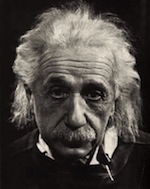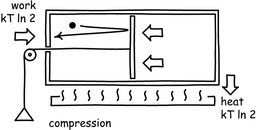
Carl Friedrich
von Weizsäcker Lectures
University of Hamburg
June 21- June 25, 2010
Lecture website at University of Hamburg

John D. Norton
Department of History and Philosophy of Science
Center for Philosophy of Science
University of Pittsburgh
homepage

21 June, 18.15-20.00, Hörsaal B, Edmund-Siemers-Allee 1 (Hauptgebäude der Universität)
Philosophy played a role in two of Einstein's greatest moments of discovery. In the first, Einstein resolved his long standing problems in reconciling the principle of relativity with electrodynamics by proposing that judgments of simultaneity are frame dependent. That realization was decisively furthered by his reading of the epistemology of Hume and Mach. However, contrary to what you might expect, the decisive insight was not drawn from their writings on philosophy of space and time. When Einstein completed his general theory of relativity, an astonished Einstein came to the realization that there is a royal road to Nature's secrets. They could be found by writing down the simplest admissible mathematical laws. He abandoned his earlier flirtations with positivism and became a Platonist.
Reading:
John D. Norton, "How Hume and Mach Helped Einstein Find Special Relativity," Prepared for M. Dickson and M. Domski, eds., Discourse on a New Method: Reinvigorating the Marriage of History and Philosophy of Science. Open Court, forthcoming. Download.
John D. Norton, "'Nature in the Realization of the Simplest Conceivable Mathematical Ideas¹: Einstein and the Canon of Mathematical Simplicity," Studies in the History and Philosophy of Modern Physics, 31 (2000), pp.135-170. Download.
For an easy read on a big topic:
John D. Norton, "How Did
Einstein Think?" Goodies Page

Tuesday, 22 June, 18:15-20:00 (ESA 1, Hörsaal B)
Both science and philosophy have sought to understand the connectedness of things in the world. The two projects have come into conflict when causal metaphysicians posit that the world is causal in a sense that is antecedent to all sciences. This doctrine of causal fundamentalism amounts to a form of a priori science against which I argue. The prevalence of causal principles and notions in modern physics does not vindicate causal fundamentalism; they arise merely as useful labels for contingent features of our present science.
Reading:
John D. Norton, "Causation as Folk Science," Philosophers' Imprint Vol. 3, No. 4
John D. Norton, "Do the Causal Principles of Modern Physics Contradict Causal Anti-Fundamentalism?" pp. 222-34 in Thinking about Causes: From Greek Philosophy to Modern Physics . eds. P. K. Machamer and G. Wolters, Pittsburgh: University of Pittsburgh Press, 2007.
John D. Norton, "Is There an Independent Principle of Causality in Physics?" British Journal for the Philosophy of Science, 60 (2009), pp. 475-86.

Wednesday 23 June, 16:15-18:00 (ESA 1, Hörsaal J)
The "dome" is the simplest instance of many systems in Newtonian theory that exhibit indeterminism. It is a system that remains completely quiescent for an arbitrary time and then springs into motion. The debate over whether such systems are properly classified as Newtonian has proved revealing. It has forced us to reflect critically over which idealization are admissible in physical theories and even what Newtonian theory really is. Finally it has drawn attention to a notion of possibility central to the practice of physicists--"being physical"--that has otherwise eluded philosophical scrutiny.
Reading:
John D. Norton, "The Dome: An Unexpectedly Simple Failure of Determinism" Proceedings of the 2006 Biennial Meeting of the Philosophy of Science Association, Philosophy of Science, 75, No. 5, (2008). pp. 786-98. Download.
John D. Norton, "The Dome: A Simple Violation of Determinism in Newtonian Mechanics." Goodies page.

Thursday, 24 June, 16:15–18:00 (Hörsaal des Fachbereichs Physik, Jungiusstraße 9)
"Szilard's Principle" and "Landauer's Principle" purport to connect the
notion of information with the physical quantity of thermodynamic entropy.
These principles are then used to argue for the necessary failure of a
Maxwell's demon, who seeks to reverse the second law of thermodynamics by
microscopic manipulations. It is, I argue, too good to be true that a general
notion like information can enter in a lawful relationship with a physical
quantity like thermodynamic entropy. The attempts to sustain the relationship
are either trivial and question-begging or ungrounded speculation. Indeed, much
of the discussion is driven by misconceptions over just which probability
distributions or ensembles can properly be associated with thermodynamic
entropy.
Reading:
John Earman and John D. Norton, "Exorcist XIV: The Wrath of Maxwell's Demon." Studies in the History and Philosophy of Modern Physics, Part I "From Maxwell to Szilard" 29(1998), pp.435-471; Part II: "From Szilard to Landauer and Beyond," 30(1999), pp.1-40. Download.
John D. Norton, "Eaters of the Lotus: Landauer's Principle and the Return of Maxwell's Demon." Studies in History and Philosophy of Modern Physics, 36 (2005), pp. 375-411. Download.
"Waiting for Landauer," manuscript. Download.

Friday, 25 June, 16:15-18:00 (ESA 1, Hörsaal J)
It has become routine to use the probability calculus as a logic of induction. While this approach enjoys many notable successes, it fails when it is applied to problems in which evidence has neutral bearing. A probabilistic development of induction conflates the evidential neutrality of "not supporting" with the evidential disfavoring of "supporting not-." This confusion has encouraged inductive fallacies in cosmologies. Some simple examples include van Inwagen's argument for why there is very likely something and the "doomsday" argument. I suggest that there is a broad danger of further fallacy in cosmology.
Reading:
John D. Norton, "Cosmic Confusions: Not Supporting versus Supporting Not-". Philosophy of Science, forthcoming. Download.